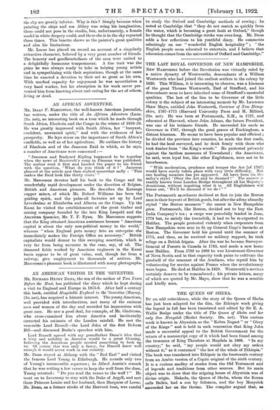THE LAST ROYAL GOVERNOR OF NEW HAMPSHIRE.
NEW HAMPSHIRE before the Revolution was virtually ruled by a native dynasty of Wentworthe, descendants of a William Wentworth who had joined the earliest settlers in the colony by 1639. This William, it is interesting to observe, was a kinsman of the great Thomas Wentworth, Earl of Strafford, and his descendants seem to have inherited some of Strafford's masterful qualities. The last of the line to be Governor of the little colony is the subject of an interesting memoir by Mr. Lawrence Shaw Mayo, entitled John Wentworth, Governor of .New Hamp- shire, 1767-1775 (Harvard University Press and H. Milford, 21s. net). He was born at Portsmouth, N.H., in 1737, and educated at Harvard, where John Adams, the future President, was one of his intimate friends. He succeeded his uncle as Governor in 1767, through the good graces of Rockingham, a distant kinsman. He seems to have been popular and efficient ; he divided the province into counties, he made the first roads, he had the land surveyed, and he dealt firmly with those who took timber from "the King's woods." He protested privately against the tactless measures of Townshend ; the Americans, he said, were loyal but, like other Englishmen, were not to be browbeaten.
"With moderation, prudence and temper the Act [of 17671 would have surely taken place with very little difficulty. Not one healing measure has yet appeared. All have been (in the sailor's style) 'Obey the Act and be damned I' The answer is readily known from London Bridge throughout all his Majesty's dominions, without inquiring what it is. All Englishmen will huzza out, We'll be damned if we do !
The Portsmouth merchants declined at first to join the Boston men in their boycott of British goods, but after the affray absurdly styled "the Boston massacre" the unrest in New Hampshire grew. Portsmouth, like Boston, decided not to buy the East India Company's tea ; a cargo was peacefully landed in June, 1774 but, to satisfy the townsfolk, it had to be re-exported to Halifax. The people protested violently when carpenters from New Hampshire were sent to fit up General Gage's barracks at Boston. The Governor held his ground until the summer of 1775, and then, an he received no military support, he took refuge on a British frigate. After the war he became Surveyor- General of Forests in. Canada in 1783, and made a new home near Halifax. From 1792 to 1808 he was Lieutenant-Governor of Nova Scotia and in that capacity took pains to cultivate the goodwill of the remnant of the Acadiuns, who repaid him by volunteering for service against France when the revolutionary wars began. He died at Halifax in 1820. Wentworth's services certainly deserve to be remembered ; his private letters, many of which are quoted by Mr. Mayo, show that he was a sensible and kindly man.


































 Previous page
Previous page